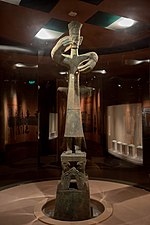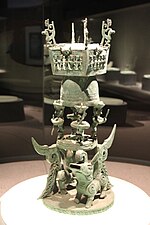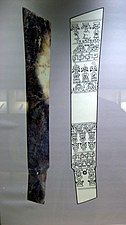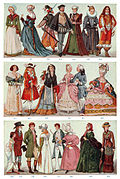Clothing in ancient Shu

Clothing in ancient Shu refers to clothing worn in the Ancient Kingdom of Shu (1046 BC? – c. 316 BC, modern-day Chengdu Plain, Sichuan). Archaeological finds in Sanxingdui and Jinsha sites have provided the best source of information on ancient Shu costume. Shu clothing's right over left lapel closing (zuoren) was considered "very strange" by Yang Xiong, a 1st-century BC author from Pi County, Chengdu, as in contrast to contemporary Chinese Western Han clothing's left over right lapel closing (youren).[2]
Overview
The large bronze figure uncovered at Sanxingdui wears a crown-like headdress and three layers of robes of fancy design,[3] which are referred to as the "royal dress" of ancient Shu by Chinese archaeologists. The outer garment with short sleeves is covered with intricately designed patterns of birds and mythical creatures.[2] The middle garment is mostly hidden for being the shortest of the three, with its V-shaped neckline visible. The longest inner garment with tight long sleeves is partially visible from the back,[4] which has a swallow-tailed hem.[2]
The most common clothing worn by those bronze figures comprises a tight jacket, or a close-fitting, usually knee length tunic with a belt, and a pair of tight pants. The jackets are mostly plain and simple without decoration, while the tunics have linear geometric patterns, albeit much less intricate compared to the "royal dress".[3] One exception is the jacket worn by a bronze figure with an animal-form headdress, decorated with motifs, according to Li Laiyu, resembling cloud and lightning.[5]
Gallery
-
 Large bronze figure from Sanxingdui
Large bronze figure from Sanxingdui -
 Bronze figurine from Jinsha
Bronze figurine from Jinsha -
 Bronze altar with male figures wearing belted tunics, Sanxingdui
Bronze altar with male figures wearing belted tunics, Sanxingdui -
 Female figures carved on jade blade, Sanxingdui
Female figures carved on jade blade, Sanxingdui -
 Bronze figurines wearing plain jackets and tight pants, Sanxingdui
Bronze figurines wearing plain jackets and tight pants, Sanxingdui -
 Bronze figurines wearing belted tunics, Sanxingdui
Bronze figurines wearing belted tunics, Sanxingdui
See also
References
- ^ Te Winkle, Kimberley S. (2005). "A Sacred Trinity: God, Mountain and Bird. Cultic Practices of the Bronze Age Chengdu Plain" (PDF). Sino-Platonic Papers (149): 13. ISSN 2157-9679. Retrieved April 23, 2023.
- ^ a b c d Xiaoye (2021). "三千多年前三星堆人穿什么?" [What did Sanxingdui people wear three thousand years ago?]. 天府广记 [Extensive Records of the Land of Abundance] (in Simplified Chinese). No. 3. Chengdu: Chengdu Committee of the Chinese People's Political Consultative Conference. Retrieved April 23, 2023.
- ^ a b Wu, Weixi (July 19, 2021). "服飾" [Clothing]. 回到塵封的古蜀國:三星堆解密 [Back to Ancient Kingdom of Shu: Unlocking Sanxingdui] (in Traditional Chinese). Taipei: Sonbook Publishing. ISBN 9789865168025.
- ^ Xu, Jay (lecturer) (September 11, 2021). Saturday University: Sanxingdui, A Lost Civilization (Lecture video). Seattle: Gardner Center for Asian Art and Ideas. Event occurs at 28:20.
- ^ Li, Laiyu (July 21, 2015). "三星堆遗址中的古代蜀人服饰" [Costumes of the Ancient Shu people from Sanxingdui]. kaogu.cn (in Simplified Chinese). Retrieved April 25, 2023.
- v
- t
- e
| States and kingdoms |
|
|---|---|
| Events |
|
- Ba–Shu culture
- Clothing in ancient Shu
- Sichuan embroidery
- Sichuanese cuisine
- Sichuanese liquor [zh]
- Mengding Ganlu tea
- Panda tea
- Sichuan opera
- Sichuanese music
- Lord of Sichuan
- Sichuanese architecture
- Sichuanese garden
- Sichuanese (lingua franca)
- Ba–Shu (extinct)
- Hakka
- Xiang
- Sichuanese Standard Chinese
- Kham
- Jiarongic
- Qiangic
- Nuosu
 Category
Category Commons
Commons
- see also
- Greater Sichuan
- Chongqing




















